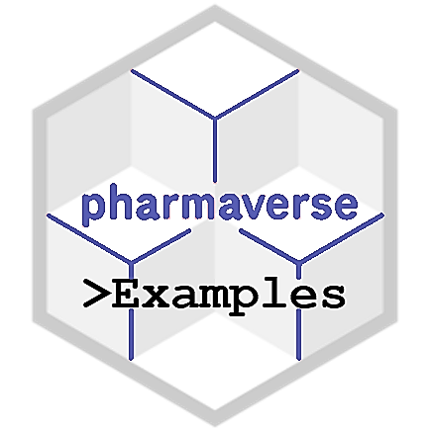ADTTE
Introduction
This article provides a step-by-step explanation for creating an ADaM ADTTE (Time-to-Event) dataset with common oncology endpoint parameters using key pharmaverse packages along with tidyverse components. ADTTE datasets often involve calculating time-to-event variables for endpoints such as Overall Survival (OS) and Progression-Free Survival (PFS).
For the purpose of this example, we will use the ADSL and ADRS_ONCO datasets from {pharmaverseadam}.
Load Required Packages
First, we will load the necessary packages:
Load Specifications and Source Data
We will load our specification file into a {metacore} object to trace the dataset variables and attributes. Then, we will read the source data.
Define Event and Censoring Sources
We define event and censoring sources using the admiral::event_source() and admiral::censor_source() functions. This forms the basis for calculating time-to-event endpoints. Find other {admiral} functions and related variables by searching admiraldiscovery.
# Define event and censoring sources
death_event <- event_source(
dataset_name = "adrs",
filter = PARAMCD == "DEATH" & AVALC == "Y" & ANL01FL == "Y",
date = ADT,
set_values_to = exprs(
EVNTDESC = "Death",
SRCDOM = "ADRS",
SRCVAR = "ADT"
)
)
pd_event <- event_source(
dataset_name = "adrs",
filter = PARAMCD == "PD" & ANL01FL == "Y",
date = ADT,
set_values_to = exprs(
EVNTDESC = "Progressive Disease",
SRCDOM = "ADRS",
SRCVAR = "ADT"
)
)
lastalive_censor <- censor_source(
dataset_name = "adsl",
date = LSTALVDT,
set_values_to = exprs(
EVNTDESC = "Last Known Alive",
CNSDTDSC = "Last Known Alive Date",
SRCDOM = "ADSL",
SRCVAR = "LSTALVDT"
)
)
lasta_censor <- censor_source(
dataset_name = "adrs",
filter = PARAMCD == "LSTA" & ANL01FL == "Y",
date = ADT,
set_values_to = exprs(
EVNTDESC = "Progression Free Alive",
CNSDTDSC = "Last Tumor Assessment",
SRCDOM = "ADRS",
SRCVAR = "ADT"
)
)
rand_censor <- censor_source(
dataset_name = "adsl",
date = RANDDT,
set_values_to = exprs(
EVNTDESC = "Randomization Date",
CNSDTDSC = "Randomization Date",
SRCDOM = "ADSL",
SRCVAR = "RANDDT"
)
)Derive Time-to-Event Parameters
The admiral::derive_param_tte() function is used to derive parameters such as OS (Overall Survival) and PFS (Progression-Free Survival).
# Derive Overall Survival (OS)
adtte <- derive_param_tte(
dataset_adsl = adsl,
start_date = RANDDT,
event_conditions = list(death_event),
censor_conditions = list(lastalive_censor, rand_censor),
source_datasets = list(adsl = adsl, adrs = adrs),
set_values_to = exprs(PARAMCD = "OS", PARAM = "Overall Survival")
)
# Derive Progression-Free Survival (PFS)
adtte_pfs <- adtte %>%
derive_param_tte(
dataset_adsl = adsl,
start_date = RANDDT,
event_conditions = list(pd_event, death_event),
censor_conditions = list(lasta_censor, rand_censor),
source_datasets = list(adsl = adsl, adrs = adrs),
set_values_to = exprs(PARAMCD = "PFS", PARAM = "Progression-Free Survival")
)Sample of Data
Derive Analysis Value (AVAL)
The analysis value (AVAL) can be derived by calling the admiral::derive_vars_duration() function.
Sample of Data
Derive Analysis Sequence Number (ASEQ)
We derive the sequence number for each record to uniquely identify them using the admiral::derive_var_obs_number() function.
Add ADSL Variables
Additional variables from the ADSL dataset are merged into the ADTTE dataset using the admiral::derive_vars_merged() function to enrich it.
Apply Metadata and eSub Checks
We use {metatools} and {xportr} to perform checks, apply metadata such as types, lengths, labels, and write the dataset to an XPT file.
# Apply metadata and perform checks
adtte_adsl_checked <- adtte_adsl %>%
add_variables(metacore) %>%
drop_unspec_vars(metacore) %>%
check_variables(metacore) %>%
check_ct_data(metacore) %>%
order_cols(metacore) %>%
sort_by_key(metacore)
# Apply apply labels, formats, and export the dataset to an XPT file.
adtte_final <- adtte_adsl_checked %>%
xportr_type(metacore, domain = "ADTTE") %>%
xportr_length(metacore) %>%
xportr_label(metacore) %>%
xportr_df_label(metacore)
# Write dataset to XPT file (optional)
dir <- tempdir()
xportr_write(adtte_final, file.path(dir, "adtte.xpt"))